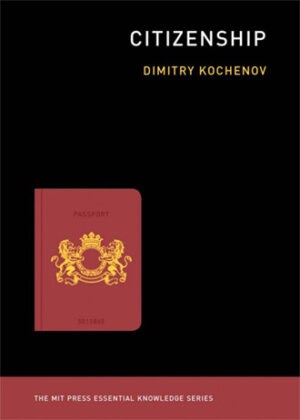The 'Dark Side' of Citizenship

Accounts of the glories and dignity of citizenship are everywhere, yet it is the arbitrariness, violence, and servility attending the concept that we must focus on when we interrogate it, argues Dimitry Kochenov, an expert on citizenship, nationality, and immigration law, in his book “Citizenship.” “Add to this citizenship’s inherent racism, its deep and chronic exclusion of women, and its upholding and reinforcing of class divisions between the haves and have-nots,” he writes, “and it becomes clear why citizenship is at a crossroads today: the ideals it emerged to defend have little to do with all that drives the thinking behind a good society in the contemporary world.”

In September, Kochenov took to Reddit to host an Ask Me Anything (AMA) session, where for two hours he expertly fielded questions from inquisitive redditors. The upshot: As much as citizenship is an instrument of political empowerment and positive identity building, it is a calculated tool to tame populations, local and foreign, into complacency and to uphold the status quo of local and global injustice. Below, you’ll find a sample of those exchanges, which have been lightly edited for clarity and style; the entire discussion can be found here.
1) One of the more popular politicians in our country often talks of “pull-effects” on immigration, claiming that allowing “too many” migrants or making the path to asylum or citizenship too easy increases the number of immigrants and refugees coming to our country. Is there any evidence for this? Additionally, and more controversially maybe: I hang with often radical people who are often very into open borders (or more precisely, claiming that borders shouldn’t exist). What’s your view on that?
Dimitry Kochenov: Having no borders is not really as radical as it might seem: We have this in the majority of modern democracies today (unlike the states in the past) — and even at the level of larger entities, offering free movement, which includes settlement and work rights to citizens of several countries at once. The EU or the GCC are great examples. Citizenship is thus not always about creating the borders — it can also be about, precisely, removing them. And on this count being an Icelander with dozens of countries welcoming you to stay is much better than holding a passport of Madagascar, opening zero doors for settlement and work outside of the country. Given that no borders works for the Icelanders and it is perfectly fine, to claim that it is outrageous and radical for the citizens of Madagascar seems somewhat unfair.
And concerning “too many” and “too few” immigrants, the world is too diverse to make easy generalizations — the “immigrant,” just like a “citizen,” is the creature of the law: if naturalizing is easy, immigrants are never in the majority. If naturalizing is virtually impossible, like in the Gulf, then everyone is suddenly an immigrant. This is exactly the totalitarian nature of citizenship at play: The persons themselves have zero say in the matter, while public authorities claim people right from the moment of birth (or later) and these claims cannot usually be refused.
2) Would you be able to summarize your suggested improvements or replacements for citizenship? Example: One of the advantages of citizenship is the fact that you can get a passport, which is a way for your home country to vouch for you. Absent citizenship, what mechanism would you propose to control travel across borders?
D.K.: This is a wonderful question, which takes the current shape of the world for granted: Borders are taken for granted, passports are taken for granted, just as the hostility to someone, who is not “from here.” This world, the world of nation-states, is quite new and will obviously not last forever. One of my main problems with citizenship, as I try to explain in the book, is that the idea of citizenship goes radically against all the core ideals our current notion of freedom, liberty and deserving are building upon. That this is the case had great reasons in the past. Citizenship as an absolute abstraction from the individual features of the bearer had to emerge when the core struggle was the struggle against caste systems in society: The vote of a baron had to count the same way as the vote of a peasant. The contemporary world, however, is radically different. The legal fiction — the absolute abstraction — which is citizenship has a difficult time when discrepancies between different citizenships in terms of the rights one can enjoy on the basis of these statuses are huge, while the status of citizenship as such is distributed purely at random. Consequently, from an instrument to guarantee and promote equality, citizenship emerged as the key tool of suppressing the idea of giving reasons to underpin the distribution of the most important rights. The question of “how can the world be without citizenship?” is thus a question, in essence, about how to stop distributing privilege at random, while using randomized distribution in order to impose glass ceilings and be legally allowed as well as morally safe to say “she is not a citizen, she has no rights, reasons do not matter.”
To come to the bottom of the question, the Schengen zone offers an excellent example of “mechanisms to travel across borders” — the borders are sometimes marked and crossed by speed train lines and wonderful highways.
From an instrument to guarantee and promote equality, citizenship emerged as the key tool of suppressing the idea of giving reasons to underpin the distribution of the most important rights.
3) Do you think the non-EU part of Eastern Europe will ever have a visa-free regime with the EU (I mean Russia, Belarus, Ukraine, etc.) in the same terms as there is within the EU right now?
D.K.: Borders, suspicions, and hatreds are policy choices. It is important to realize, however, that borders exist at different levels: These can be the boundaries for simple travel for a short-term stay (on this count Ukraine is already part, together with Moldova and Georgia of the larger European space); boundaries for settlement and work (on this count Ukraine is out, but Switzerland, Iceland, and Norway still are in); and the boundaries of citizenship, when the nationals of some countries would be excluded from the beginning. Take a national of the Turkish Republic of Northern Cyprus or South Ossetia, for instance. Such people are legally claimed by the entities too questionable to be palatable for the majority of the European nations, so they cannot even naturalize in the EU, should they meet all the conditions of the country of residence, with such documents.
To move closer to your question: Russia is currently the most atypical country in the world from the point of view of tourist and business visa policy, since it lets all the nationals of the poorer and less developed nations in visa-free, locking its doors behind a visa wall for Europeans and Americans. All the other countries are the exact opposite, offering visa-free travel to the citizens of richer and higher-developed nations. Picking friends is a matter of taste though, even if taste is peculiar. In the long term it would be illogical to keep the European continent cut by visa walls. The world, however, is frequently illogical.

4) What’s your take on abusive spouses that don’t let you leave, that is, states that make it extraordinarily difficult for people to renounce their citizenship?
D.K.: Not all the states refusing their citizens the right to renounce could correctly be compared to abusive spouses, it seems to me. The inability to renounce can definitely be an asset, a weapon against a different kind of abuse, when states of naturalization require the renunciation of previously held citizenships, thereby legally mandating a sacrifice of rights, which is difficult to justify. Both the inability to renounce and the obligation to renounce thus can be problematic. The core of the matter, of course, is whether the citizen herself can decide.
The totalitarian logic of citizenship constantly clashes with our idea of freedom.
In the contemporary understanding of freedom and liberty, we expect to be able to make this kind of decision as we see fit. Yet, citizenship logic is quite different from the logic of liberty and freedom — since citizenship is a legal status attributed in the absolute majority of cases immediately following someone’s birth without any consent or ability to disagree with this attribution. A foreigner born to tourists passing through the U.S. is an American, however “incidental,” while the grandson of a Greek whose father has never visited Greece is Greek (and unable to renounce). The totalitarian logic of citizenship thus constantly clashes with our idea of freedom — and this is a constantly recurrent story, ultimately undermining citizenship’s justifications and annihilating its moral appeal.
5) Given that citizenship and ethnicity are often connected in the context of European nation-states, just look at Eastern Europe, should we be giving out citizenships to immigrants after a number of years compared to just some type of “long term residency”? What would be the advantages (if any) and disadvantages of that and how do you think the far right would react to such a move? Would such a move even matter in the EU?
D.K.: Citizenship and ethnicity is a difficult connection, since it breeds intolerance. In terms of equal human worth ethnicity is an irrelevant feature. Citizenship, as a status of legal recognition of full belonging to an authority cannot be made dependent on the color of someone’s eyes, or pigmentation of the skin. Nor only Eastern Europe, also many other countries and places not infrequently come with racist undertones in their citizenship policy. After all, citizenship has traditionally been a truly racist concept, since the Western empires dominating the world would not guarantee non-discrimination on this ground, often explicitly enforcing “whites only” policy. Their former colonies learned the lesson well — in Liberia one still needs to be a “Negro,” if I am not mistaken, to enjoy the status of citizenship. The official explanation, from the extreme right in Poland to the racist Liberian constitution, is always the same: social cohesion, culture and the like. Human culture is much richer, however, then policing the dispensation of liabilities based on the pigmentation of someone’s skin, and the developments of the second half of the 20th century allow us to trace a huge evolution on this count. The U.S., France, the Netherlands — formerly deeply racist countries as far as their citizenship policy was concerned — now play a totally different tune.
Citizenship and ethnicity is a difficult connection, since it breeds intolerance.
There is another side of this coin, which is not necessarily positive: Racist citizenship policy — that a Chinese or an Indian could not naturalize in the U.S.; that a woman marrying a colonial “native” in the Netherlands would lose her birthright Dutch citizenship, etc. gave way, with decolonization, to an essentially racist gradation of citizenship rights and liabilities around the world. Now that the former colonial subjects who used to have second-rate statuses in the Empires enjoy their own states, the citizenships those states distribute are often — in the majority of cases — steeply inferior in terms of the rights they bring to the citizenships of the former colonial masters. In other words, although individual citizenship outside of some African states are, by law, not any more racist, the world of rights and liabilities related to the different citizenship statuses in the world remains quite a racist place.
Dimitry Kochenov is Professor of EU Constitutional Law at the University of Groningen, the Netherlands. He is the author of the book “Citizenship.”



